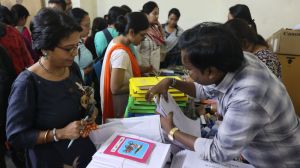Govt slipped a clause in POTA: power to over-rule even the courts
On December 16, the very day the Supreme Court upheld the constitutional validity of POTA, the Lok Sabha passed an amendment to this anti-te...

On December 16, the very day the Supreme Court upheld the constitutional validity of POTA, the Lok Sabha passed an amendment to this anti-terror law that threatens to compromise the independence of the judiciary.
For, the POTA Amendment Bill slipped in a clause that effectively lets a review committee—appointed by the Government of the day—to issue directions binding not only on Central and state Governments but on the courts as well.
The Bill, which has since been cleared by the Rajya Sabha too, is awaiting the President’s assent.
The Bill was meant to replace the Ordinance issued on September 27 that sought to give more teeth to the review committee to check POTA’s misuse. Significantly, the Ordinance didn’t extend the committee’s powers to the courts.
As does the controversial Section 60(7) in the Bill: ‘‘Where any review committee is of opinion that there is no prima facie case for proceeding against the accused and issues directions, then the proceedings pending against the accused shall be deemed to have been withdrawn from the date of such direction.’’
In other words, once the review committee orders the withdrawal of a case pending trial, the proceedings are ‘‘deemed’’ to have been withdrawn with or without the consent of the court concerned.
This flies in the face of the law laid down by the Supreme Court in 1996—in the context of TADA—stating that the withdrawal of a case at the instance of a TADA review committee is ‘‘not to be permitted mechanically by the court on an application by the public prosecutor.’’
Because of this ruling, there was already uncertainty about whether the POTA review committee’s directions to the Government could be binding on the prosecution.
This is because the apex court also held that ‘‘the public prosecutor has to satisfy himself that it is a fit case for withdrawal from prosecution before he seeks the consent of the court for that purpose.’’
Government officials claim that this clause will not affect the judiciary because it is intended to be a safeguard against POTA’s misuse and because the review committee appointed by the Centre is anyway headed by a former high court chief justice, Arun Saharya.
Justice Saharya, when contacted, said he was aware of the new change made by the Bill but added: ‘‘It will not be appropriate for me to make any comment on it.’’
The review committee is due to resume its proceedings on the Vaiko case on January 7.
Counsel for Tamil Nadu C S Vaidyanathan said that ‘‘the whole complexion’’ of the POTA controversy will change if the President gives his assent by then.
According to Vaidyanathan, the review committee is ‘‘purely an administrative body’’ since it has not been given the judicial power to summon anybody or order the production of any document.
‘‘The very idea of allowing an external agency to nullify a judicial action goes against the grain of the Constitution,’’ he says.
Photos



- 01
- 02
- 03
- 04
- 05




























